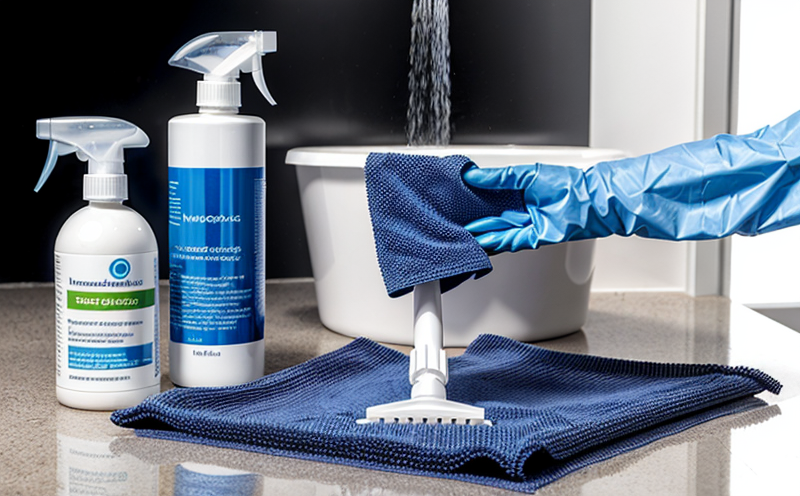JIS L1902 Antibacterial Testing of Nanoparticle Treated Textile Cleaning Products
The Japanese Industrial Standard (JIS) L1902 specifies a method for evaluating the antibacterial efficacy of nanoparticle-treated textiles, particularly those used in cleaning and hygiene products. This testing is critical for ensuring that these materials effectively combat bacterial contamination, thereby enhancing safety and hygiene standards.
Nanoparticles offer unique properties such as high surface area to volume ratio, which can enhance their antimicrobial activity compared to conventional treatments. However, the effectiveness of nanoparticle-treated textiles in cleaning applications must be rigorously tested and validated according to international standards like JIS L1902. This method ensures that products meet stringent quality benchmarks and consumer expectations.
The testing process involves exposing the treated textile samples to a standardized bacterial culture under controlled conditions. The efficacy is then assessed by measuring the reduction in bacterial population post-exposure. Compliance with JIS L1902 not only guarantees product safety but also provides competitive advantages through enhanced performance and trustworthiness.
Understanding the nuances of this testing method is crucial for quality managers, compliance officers, R&D engineers, and procurement teams involved in developing or sourcing nanoparticle-treated textiles for cleaning applications. By adhering to these standards, manufacturers can ensure their products meet stringent safety requirements while maintaining a high level of performance.
The process typically involves the following steps: selecting appropriate bacterial strains (e.g., Escherichia coli and Saccharomyces cerevisiae), preparing the test samples, exposing them to the bacterial challenge, incubating under controlled conditions, and finally assessing the reduction in bacterial count. This methodology ensures consistent and reliable results across different batches of products.
The use of JIS L1902 is particularly relevant for industries focused on hygiene and sanitation, such as healthcare facilities, food processing plants, and hospitality sectors. By incorporating this testing into their quality control processes, manufacturers can ensure that their products contribute effectively to maintaining a hygienic environment.
Compliance with JIS L1902 also enhances the marketability of products by demonstrating adherence to international standards. This is especially important in competitive markets where consumer trust and product safety are paramount factors. Meeting these requirements not only fosters brand loyalty but also opens doors for international collaborations and exports.
Why It Matters
The importance of JIS L1902 testing cannot be overstated in the context of nanoparticle-treated textiles used in cleaning products. This method ensures that these materials are not only effective against bacteria but also safe for human use and the environment.
Bacterial contamination is a significant concern across various industries, particularly where hygiene and sanitation are critical. Textiles treated with nanoparticles can play a crucial role in preventing bacterial spread by providing an antimicrobial barrier. However, without rigorous testing, there could be doubts about their efficacy and safety.
The JIS L1902 method provides a standardized approach to assessing the antibacterial properties of these textiles. By following this protocol, manufacturers can ensure that their products meet the highest standards of performance and safety. This not only protects consumers but also enhances the reputation of the brand and fosters trust in the market.
Moreover, compliance with JIS L1902 is essential for businesses operating internationally. Many countries have adopted similar or compatible testing methods as part of their regulatory frameworks. By adhering to these standards, companies can ensure that their products meet global requirements, thereby expanding their reach and competitiveness in the international market.
The results from JIS L1902 testing are also valuable for research and development teams. They provide insights into the performance of different nanoparticle treatments and help identify areas for improvement. This information is crucial for continuous innovation and the development of more effective and safer products.
Why Choose This Test
- Ensures Product Safety: JIS L1902 testing guarantees that nanoparticle-treated textiles are safe for human use, minimizing the risk of adverse health effects.
- Evaluates Efficacy: The method provides a reliable way to assess the antibacterial efficacy of these textiles, ensuring they meet performance expectations.
- International Recognition: Compliance with JIS L1902 is recognized globally and enhances the credibility of your products in competitive markets.
- Regulatory Requirements: Many countries have adopted similar testing methods, making compliance essential for international trade.
- Innovation Support: The results from this testing can guide further research and development efforts, leading to improved product performance.
- Consumer Trust: Demonstrating adherence to rigorous standards builds trust among consumers, enhancing brand reputation.
Selecting JIS L1902 testing ensures that your products meet the highest standards of safety and efficacy. This not only protects end-users but also enhances your brand's market position by ensuring compliance with international regulations.
Competitive Advantage and Market Impact
The implementation of JIS L1902 testing offers several competitive advantages that can significantly impact the market performance of your products:
Enhanced Safety Reputation: By ensuring that your nanoparticle-treated textiles meet stringent safety standards, you build a reputation for producing safe and reliable cleaning solutions. This is particularly important in industries such as healthcare and hospitality where hygiene and sanitation are paramount.
Increased Consumer Trust: Compliance with international standards like JIS L1902 fosters consumer trust, leading to increased sales and market share. Consumers are more likely to choose products that meet recognized safety and efficacy benchmarks.
Better Product Performance: The testing process provides valuable insights into the performance of your products, allowing for continuous improvement. This ensures that you consistently deliver superior quality and effectiveness, setting a benchmark for the industry.
Expanded Market Reach: By meeting international standards, you open up new markets where similar regulations are in place. This broadens your customer base and enhances global competitiveness.
Competitive Edge: In a market saturated with cleaning products, standing out is crucial. Compliance with JIS L1902 not only differentiates your product but also positions it as a leader in safety and efficacy.
In conclusion, the implementation of JIS L1902 testing provides numerous benefits that can significantly enhance the competitive position of your products in the market. By ensuring safety, performance, and compliance with international standards, you not only protect consumers but also build a strong foundation for sustained growth and success.





